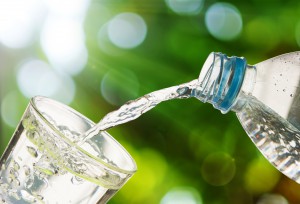From the desk of: Saroja Voruganti, Ph.D.
THE STUDY
While drinking at least eight glasses of water a day may not be necessary under normal conditions, maintaining adequate hydration, especially during physical exertion in warm weather, is essential for optimal health.
A recent article published in the American Journal of Kidney Disease suggests that exercise and dehydration contribute to development of chronic kidney disease, particularly the type that is related to heat stress. Heat stress-related kidney disease is increasingly observed in farmers, fishermen, miners, and transportation and construction workers. This type of kidney disease is also called Mesoamerican nephropathy since it was first observed in sugarcane workers in Latin America. Even though they drank a lot of water, these workers suffered high rates of chronic kidney disease.
 The authors noted decreased sodium levels and increased uric acid levels after heavy exertion. Uric acid is a breakdown product of DNA and can become elevated with muscle damage. Thus, exercising or working under hot conditions results not only in water loss, but also sodium loss and low-grade muscle injury, which ultimately affect kidney function. Muscle injury and dehydration also cause uric acid to increase, which again results in kidney injury. Kidney injury intensifies with continuous exposure to heat, exercise and dehydration and finally develops into chronic kidney disease. Therefore, maintaining an adequate level of hydration by drinking water with electrolytes at frequent intervals seems to prevent the increase in uric acid levels that occur with heat and exercise.
The authors noted decreased sodium levels and increased uric acid levels after heavy exertion. Uric acid is a breakdown product of DNA and can become elevated with muscle damage. Thus, exercising or working under hot conditions results not only in water loss, but also sodium loss and low-grade muscle injury, which ultimately affect kidney function. Muscle injury and dehydration also cause uric acid to increase, which again results in kidney injury. Kidney injury intensifies with continuous exposure to heat, exercise and dehydration and finally develops into chronic kidney disease. Therefore, maintaining an adequate level of hydration by drinking water with electrolytes at frequent intervals seems to prevent the increase in uric acid levels that occur with heat and exercise.
TAKE HOME MESSAGE
Maintaining adequate hydration in conditions of heat and exercise is important to minimize risk of kidney injury, but chronic heat and physical exertion stress kidney function and can cause kidney damage even when water is consumed. Under these conditions, it is important to stay extra hydrated to avoid increased uric acid levels and muscle damage, which also contribute to the risk of long-term kidney damage.
Reference: American Journal of Kidney Diseases 2015; Oct 5. pii: S0272-6386(15)01156-7. doi: 10.1053/j.ajkd.2015.08.021
